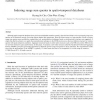Free Online Productivity Tools
i2Speak
i2Symbol
i2OCR
iTex2Img
iWeb2Print
iWeb2Shot
i2Type
iPdf2Split
iPdf2Merge
i2Bopomofo
i2Arabic
i2Style
i2Image
i2PDF
iLatex2Rtf
Sci2ools
110
Voted
INFSOF
2007
2007
Indexing range sum queries in spatio-temporal databases
Although spatio-temporal databases have received considerable attention recently, there has been little work on processing range sum queries on the historical records of moving objects despite their importance. Since the direct access to a huge amount of data to answer range sum queries incurs prohibitive computation cost, materialization techniques based on existing index structures are suggested. A simple but effective solution is to apply the materialization technique to the MVR-tree known as the most efficient structure for window queries with spatio-temporal conditions. Aggregate structures based on other index structures such as the HR-tree and the 3DR-tree do not provide satisfactory query performance. In this paper, we propose a new index structure called the Adaptively Partitioned Aggregate R-Tree (APART) and query processing algorithms to efficiently process range sum queries in many situations. Our experimental results
Related Content
| Added | 15 Dec 2010 |
| Updated | 15 Dec 2010 |
| Type | Journal |
| Year | 2007 |
| Where | INFSOF |
| Authors | Hyung-Ju Cho, Chin-Wan Chung |
Comments (0)

